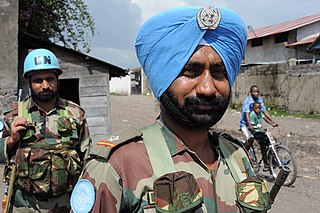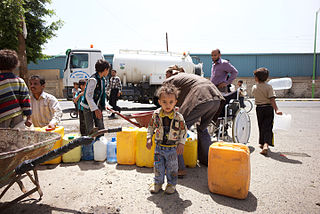
An internally displaced person (IDP) is someone who is forced to leave their home but who remains within their country's borders. They are often referred to as refugees, although they do not fall within the legal definitions of a refugee.

The United Nations Human Rights Council (UNHRC) is a United Nations body whose mission is to promote and protect human rights around the world. The Council has 47 members elected for staggered three-year terms on a regional group basis. The headquarters of the Council are at the United Nations Office at Geneva in Switzerland.

Human rights in Yemen are seen as problematic. The security forces have been responsible for torture, inhumane treatment and even extrajudicial executions. In recent years there has been some improvement, with the government signing several international human rights treaties, and even appointing a woman, Dr. Wahiba Fara’a, to the role of Minister of the State of Human Rights.
Accusations of violations regarding international humanitarian law, which governs the actions by belligerents during an armed conflict, have been directed at both Israel and Hamas for their actions during the Gaza War. The accusations covered violating laws governing distinction and proportionality by Israel, the indiscriminate firing of rockets at civilian locations and extrajudicial violence within the Gaza Strip by Hamas. As of September 2009, some 360 complaints had been filed by individuals and NGOs at the prosecutor's office in the Hague calling for investigations into alleged crimes committed by Israel during the Gaza War.

The United Nations Fact Finding Mission on the Gaza Conflict, also known as the Goldstone Report, was a United Nations fact-finding mission established in April 2009 pursuant to Resolution A/HRC/RES/S-9/1 of the United Nations Human Rights Council (UNHRC) of 12 January 2009, following the Gaza War as an independent international fact-finding mission "to investigate all violations of international human rights law and international humanitarian law by the occupying Power, Israel, against the Palestinian people throughout the Occupied Palestinian Territory, particularly in the occupied Gaza Strip, due to the current aggression". South African jurist Richard Goldstone was appointed to head the mission. The other co-authors of the Report were Hina Jilani, Christine Chinkin and Desmond Travers.

United Nations Security Council Resolution 1925, adopted unanimously on May 28, 2010, after reaffirming previous resolutions on the situation in the Democratic Republic of the Congo, the Council extended the mandate of the United Nations Mission in the Democratic Republic of Congo (MONUC) until June 30, 2010, authorised a withdrawal of 2,000 troops and decided that from July 1, 2010, MONUC would be known as the United Nations Organization Stabilization Mission in the Democratic Republic of the Congo (MONUSCO) with a mandate until June 30, 2011.
United Nations Security Council Resolution 1935, adopted unanimously on July 30, 2010, after reaffirming all previous resolutions and statements on the situation in Sudan, the Council extended the mandate of the African Union – United Nations Hybrid Operation in Darfur (UNAMID) for a further 12 months until July 31, 2011 and demanded an end to fighting and attacks on United Nations personnel and civilians.
Marib District is a district of the Ma'rib Governorate, Yemen. As of 2003, the district had a population of 39,495 inhabitants.

Targeted killing is a form of assassination carried out by governments outside a judicial procedure or a battlefield.

Since the September 11 attacks, the United States has carried out drone strikes in Pakistan, Yemen, Somalia, Afghanistan, Iraq and Libya. Drone strikes are part of a targeted killing campaign against militants. Determining precise counts of the total number killed, as well as the number of non-combatant civilians killed, is impossible; and tracking of strikes and estimates of casualties are compiled by a number of organizations, such as the Long War Journal, the New America Foundation, and the London-based Bureau of Investigative Journalism. The "estimates of civilian casualties are hampered methodologically and practically"; civilian casualty estimates "are largely compiled by interpreting news reports relying on anonymous officials or accounts from local media, whose credibility may vary."

The Yemeni civil war is an ongoing multilateral civil war that began in late 2014 mainly between the Rashad al-Alimi-led Presidential Leadership Council and the Mahdi al-Mashat-led Supreme Political Council, along with their supporters and allies. Both claim to constitute the official government of Yemen.

On 26 March 2015, Saudi Arabia, leading a coalition of nine countries from West Asia and North Africa, launched an intervention in Yemen following a request from Yemeni president Abdrabbuh Mansur Hadi for military support after his forces were ousted from Sanaʽa by Houthi insurgents during the Yemeni Civil War. The conflict ignited between the government forces, the Houthi rebels and other armed groups after the draft constitution and power-sharing arrangements collapsed, despite progress in the political transition led by the United Nations at that time, leading to an escalation of violence in mid-2014. The Houthis and allied insurgents seized control of Sana’a and other parts of the country in September 2014 and in the following months. This prompted President Hadi to ask Saudi Arabia to intervene against the Iranian-backed Houthis.
On 24 July 2015, between 9:30 and 10:00 p.m., the city of Mokha, Yemen, was bombed by Saudi Arabian led coalition. The airstrikes struck two worker housing complexes for engineers and technicians at the Mokha steam power plant. The attack left between 65 and 120 dead, including at least 10 children.
Human rights violations, committed by all warring parties, have been widespread throughout the Yemeni civil war. This includes the two main groups involved in the ongoing conflict: forces loyal to the current Yemeni president, Abdrabbuh Mansur Hadi, and Houthis and other forces supporting Ali Abdullah Saleh, the former Yemeni president. Al-Qaeda in the Arabian Peninsula and the Islamic State of Iraq and the Levant have also carried out attacks in Yemen. The Saudi-led coalition war crimes, backed by the United States and other nations, has also been accused of violating human rights and breaking international law, especially in regards to airstrikes that repeatedly hit civilian targets.
The Sanaa funeral airstrike took place on the afternoon of 8 October 2016 when 155 people were killed and at least 525 more wounded when two airstrikes, about three to eight minutes apart, hit the packed Al Kubra hall in Sanaa, Yemen during a funeral. The attack was the deadliest single bombing in the then-two year long Yemeni civil war. The funeral was being held for the father of former interior minister Jalal al-Rowaishan. Sanaa mayor Abdel Qader Hilal was reportedly among those killed. The Saudi-led coalition initially denied responsibility but then took responsibility and put the blame on information given by the Yemeni government.

The blockade of Yemen refers to a sea, land and air blockade on Yemen which started with the positioning of Saudi Arabian warships in Yemeni waters in 2015 with the Saudi Arabian-led intervention in Yemen. In November 2017, after a Houthi missile heading towards King Khalid International Airport was intercepted, the Saudi-led military coalition stated it would close all sea land and air ports to Yemen, but shortly began reopening them after criticism from the United Nations and over 20 aid groups and some humanitarian supplies were allowed into the country. In March 2021, Saudi Arabia denied the blockade continued, however, UN authorized ships continued to be delayed by Saudi warships.
Kamal al-Shawish is a Yemeni human rights activist who was kidnapped by the Houthi militia in August 2018 in the city of Hodeidah.

Russian war crimes are the violations of the international criminal law including war crimes, crimes against humanity and the crime of genocide which the official armed and paramilitary forces of the Russian Federation are accused of committing since the dissolution of the Soviet Union in 1991. This accusation also extends to the aiding and abetting of crimes which have been committed by quasi-states or puppet states which are armed and financed by Russia, including the Luhansk People's Republic and the Donetsk People's Republic. These war crimes have included murder, torture, terrorism, deportation or forced transfer, abduction, rape, looting, unlawful confinement, unlawful airstrikes or attacks against civilian objects, and wanton destruction.
During the Yemeni civil war, Saudi Arabia led an Arab coalition of nine nations from the Middle East and parts of Africa in response to calls from the internationally recognized pro-Saudi president of Yemen Abdrabbuh Mansur Hadi for military support after he was ousted by the Houthi movement due to economic and political grievances, and fled to Saudi Arabia.
During the presidency of Barack Obama, the United States began providing Saudi Arabia with critical support to "sustain" the Saudi Arabian–led intervention in the Yemeni Civil War, later expanded during the presidency of Donald Trump. This support included logistical and intelligence aid. Trump vetoed a bipartisan bill in 2019 aimed at stopping U.S. support for the Saudi-led coalition in Yemen. In 2021, Joe Biden vowed to halt U.S. support for the war, though U.S. arms sales to the coalition have continued.










